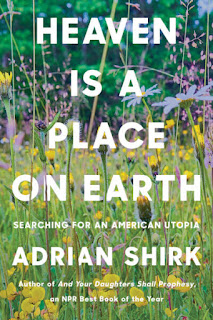 And Your Daughters Shall Prophesy (2017), a hybrid-memoir exploring American women prophets and mystics, named an NPR ‘Best Book’ of 2017. Shirk was raised in Portland, Oregon, and has since lived in New York and Wyoming. She’s a frequent contributor to Catapult, and her essays have appeared in The Atlantic, Lit Hub, and Atlas Obscura, among others. She teaches in Pratt Institute’s BFA Creative Writing Program, and lives at The Mutual Aid Society in the Catskill mountains.
And Your Daughters Shall Prophesy (2017), a hybrid-memoir exploring American women prophets and mystics, named an NPR ‘Best Book’ of 2017. Shirk was raised in Portland, Oregon, and has since lived in New York and Wyoming. She’s a frequent contributor to Catapult, and her essays have appeared in The Atlantic, Lit Hub, and Atlas Obscura, among others. She teaches in Pratt Institute’s BFA Creative Writing Program, and lives at The Mutual Aid Society in the Catskill mountains.
Shirk applied the “Page 99 Test” to Heaven Is a Place on Earth and reported the following:
Page 99 begins with the final clause of a paragraph from the page before, where I detail a conversation with my gynecologist about finding two teratoma cysts, one on each ovary. She tells me that if I don’t make plans immediately to either get them removed or have a baby, that I will risk losing my fertility, to which I respond by driving around the gloomy suburb I am currently living in, and buying myself an ice cream cone. The sentence is: “I decided to not make any decision at all.”Visit Adrian Shirk's website.
Deciding to not make any decision at all is, of course, a paradox, and one that feels very central to the book – if I think about the way that Heaven is a Place on Earth is about utopians deciding to do things that should be impossible, that couldn’t possibly work, but which they try anyway, and one of the main warnings of the book is both the costs that always come with “the leap,” but also the costs of “deciding to not making any decision at all” being often more grave a bargain than the former. The rest of page 99 is one of the more ordinary and mundane narrative moments of the book, a brief interlude where my husband and I have road-tripped to Phillips Exeter Academy where I’ve been invited as a visiting writer. We meet our kind and visionary host, the religion scholar, writer, teacher and assistant managing director of Čuvaj Se / Take Care, a literary human rights nonprofit dedicated to supporting and amplifying survivors of war and trauma, especially from Bosnia and Herzegovina. The three of us eat dinner together in the cafeteria. Tom tells us about his housing situation with his two kids and his wife; for ten years, they’ve lived for free on campus in a dorm suite, and he tells me how this was gotten to by an unhappy atomized existence a decade earlier where they felt stranded in a Midwestern suburb waiting for his academic job to pay off. He tells me about that era, coming home to his wife nightly, with what was then their two young children, and her anguish: “We can’t live like this anymore.” Though I don’t say it on that page, it echoes a statement I make earlier in the book to my husband, about our own unsustainable life in a lonely suburb taking care of his very ill father while we waited for my husband’s academic pursuits to pay off, and I worked full time, researching the history of utopian alternatives on the side.
As for whether it represents the book as a whole: On one hand, my ego is like, No way, so much of the book is this rollicking historical adventure, and this page makes it look like it is mostly a chronicle of quotidian life. But perhaps both are true. Throughout the book, I include several interstitial sections like this one, all titled LIVING, because I didn’t know how to braid my quotidian reflections into some of my historical studies without making the histories awkwardly bend to an artificial constraint. So the LIVING chapters were a temporary container that eventually became an important refrain, a critical term, an ethic that is very central to the book, and to the ever-evolving pursuit of utopian experimentation. Utopian dreaming is nothing without a central concern for the living. Utopian pursuits need to draw from the gnarly conditions of living itself, first and foremost. The big philosophies and beliefs and programs may emerge, but they are dangerous if they’re not anchored by the minute and morally ambiguous substance of daily life.
I like using page 99 of this book as a kind of divining rod. I think it works as a test, in a way I never would have expected. As much as I fancy the book to be a thrilling odyssey of the things we didn’t know happened and so didn’t know we could also do, it is also a deeply practical and personal book, where the minutiae of people’s lives and the particular conditions that led to their own innovation really matters. In a way the book resists loftiness, and is more interested in questions like, Why did my friend Tom need to radically revise what “home” meant to him? How does his experience offer us as a way to re-evaluate security, luxury, freedom, wholeness, “at least for a little while, at least for ten years.”
--Marshal Zeringue



